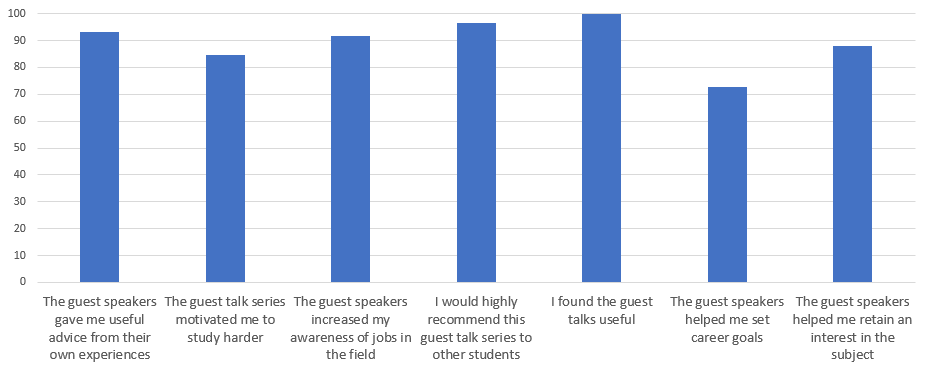Bringing industry experts into the online classroom

Dr Thanos Verousis is a Reader in Finance at Essex Business School, specialising in the study of financial markets and market microstructure. In this blog, he talks about the move to online learning as a result of the COVID-19 pandemic and how adapting his teaching methods and in particular, the use of guest speakers has contributed positively to student engagement, motivation and employability.
Studies have shown that in the not so distant future, approximately 60% of current jobs could be automated, thus making “softer”, collaborative and easily-adaptable skills even more valuable than they are now. Future graduates will need to demonstrate a blend of soft and hard, mostly technological, skills in order to succeed in the workplace. Very early on in my career as an academic, I realised that achieving this optimal mix of hard and soft skills was vital for my students’ future. However, “the times they are a-changin'”! I have been teaching and researching risk management for approximately a decade and never before in my career, has risk management been more valuable than now. Brexit, and the COVID-19 pandemic have given rise to a whole new set of risks that have effectively shifted the tectonic plates of the financial system, both in the UK and abroad. The global pandemic has also had a huge impact on teaching and learning methods, requiring both academics and students alike to adapt to the world of online learning.
The move to online learning
This year, for the first time in my career I have had to deliver my lectures online. It didn’t take long to realise that remote teaching is hard! In my face-to-face lectures, I have always been very mobile and animated, with a lot of hand-waving and interaction with students. Whereas, the default option in online teaching is effectively the opposite. More importantly, in remote teaching formats, learning and, in particular, deep learning that is associated with critical thinking and problem solving is relatively more difficult to achieve. By its very nature, online teaching can often lead to a passive, teacher-focused, non-engaging format, more often associated with large group teaching.
Overcoming challenges and increasing student engagement
In order to improve student engagement and participation, I implemented a number of teaching interventions in my online lectures. These included poll questions, flipped classroom activities and crowdsourced presentations. To enhance employability skills and bridge the gap between academia and industry, a series of guest talks by industry experts were arranged and an online roundtable event on the topic of applying for jobs in the risk management industry was organised.
In practice
I teach the Risk Management and Financial Institutions module to a large class of final year students. Most of them are in the process of applying for graduate jobs, so it is vital that they engage as much as possible with the financial services industry. Taking advantage of the opportunities associated with remote teaching, I invited industry experts as guest speakers to each of my lectures. Guest talks were short (approximately 20 minutes) and very relevant to the “topic of the week”. The informal format gave students the opportunity to ask questions and interact with the guest speakers. The guest speakers shared their experiences with students and demonstrated how what they are taught in the classroom is closely linked with industry practices. Across five teaching weeks, students had the opportunity to attend guest talks by industry experts working in Virgin Bank, Raiffeisen Bank, the S&Ps, OLS Risk Management and UBS.
During the guest talks, it became clear that students were keen to hear more from industry experts on the job application process. To facilitate this, I organised an online roundtable event on the topic of applying for jobs in the risk management industry. Students were able to submit questions to the panel members in advance of the event, which focussed on four key topics: CV writing tips, the job application process, job and salary negotiation dos and don’ts and insights into the working environment. Speakers included industry experts working in Deloitte, Gazprom, Aon, Visa and an undisclosed government agency.
Student feedback
So, how did students feel about these events? A Likert Scale questionnaire (see below) was used to evaluate their feedback and the results were overwhelmingly positive. It was clear that the use of guest speakers had a big impact not only on student employability but also on student motivation and student engagement.

The bar chart above shows the percentage of questionnaire respondents who agreed with the statements as detailed below:
- 93.2% of respondents agreed that the guest speakers gave them useful advice from their own experiences
- 84.7% of respondents agreed that the guest talk series motivated them to study harder
- 91.5% of respondents agreed that the guest speakers increased their awareness of jobs in the field
- 96.6% of respondents agreed that they would highly recommend this guest talk series to other students
- 100% of respondents agreed that they found the guest talks useful
- 72.9% of respondents agreed that the guest speakers helped them set career goals
- 88.1% of respondents agreed that the guest speakers helped them retain an interest in the subject
